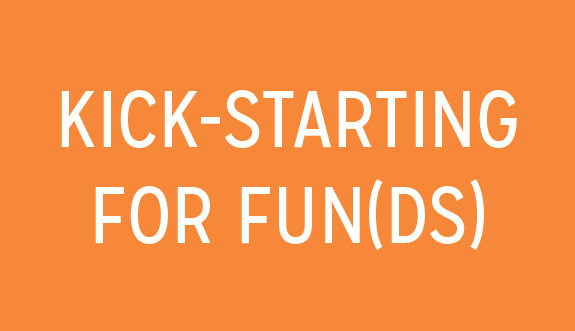In the modern age, it has become normal for people to seek out unique ways to gain revenue. One example is Kickstarter, a website that allows artists and creators to reach out to the community for funding of projects. These creators set a monetary goal, and, if it is reached, they must follow up on all promises. However, if the goal is not reached, people will get their pledge money back. Most of the time, these projects are brought to Kickstarter because the creators cannot find other means of funds. As of October, the company announced the service has reached over $2 billion in pledges from around 10 million people worldwide.
Junior Mitchell Adzema, one of the backers of the Kickstarter-funded film “Anomalisa,” said, via email, “Kickstarter helps ‘idea people.’ Money is sometimes the only barrier stopping someone from making something great, so Kickstarter is a way to help creators get around that barrier.”
According to Adzema, it is an exciting time to be a fan of entertainment because sites like this allow full creative freedom, and artists are able to express themselves in ways they weren’t able to do before.
Business teacher Domingo David agreed and said, “Kickstarter is beneficial to the creators because it allows just about anyone with an idea and working prototype to mass produce their products to be used and sold to the general public. This means that a creator doesn’t need big starting funds to be able to produce the products, thereby eliminating the need to obtain investors or loans.”
With few limitations from big companies, Kickstarter is a great way for local creators to get noticed and let the public decide the worth of the product, according to David. However, the service is not only beneficial to creators, but also to consumers. According to Adzema, it allows the public to chose where the industry goes and what gets funded, while also letting consumers involved with the production process.
“I took pride in giving money to the projects I backed and I’m sure others felt and feel the same way. So, spending money on something you support and feeling as though you contributed is a great way to spend your money,” he said.
In addition to staying informed and having a sense of pride, backers also benefit from a system of tiers, set to levels the creator chooses, based on the amount a person pledges. With these tiers, people can receive various rewards, anywhere from having their name in the credits to the physical good itself. Adzema said people should search for the benefits they want and choose the right tier.
“Find something or someone you care about. For me, it was filmmakers who I trusted to make great films. For others, it could be a chef opening a restaurant or a painter opening an exhibit. Not all Kickstarter projects work, though, so do your research before you back a project,” Adzema said.
He also said everyone should be aware of the risks they are taking by backing a project on Kickstarter. David said using Kickstarter is not without its risks, and people should be cautious while choosing what project to fund.
“As a backer, you always have to be careful. I think, for the most part, many of us can spend a few bucks funding a Kickstarter. The catch is that you should be ready to lose this money in the case that the creator is unable to ship anything out,” David said.
 According to Digital Trend, multiple projects have not fulfilled their promises. One example occurred in 2012, where the company iCache promised certain level backers “Geode,” an iPhone accessory that stores credit card information safely. Unfortunately, for some backers who paid for the new device, they did not receive anything, and those who did receive products were given malfunctioning units. Both David and Adzema said buyers should beware and do extensive research before pledging.
According to Digital Trend, multiple projects have not fulfilled their promises. One example occurred in 2012, where the company iCache promised certain level backers “Geode,” an iPhone accessory that stores credit card information safely. Unfortunately, for some backers who paid for the new device, they did not receive anything, and those who did receive products were given malfunctioning units. Both David and Adzema said buyers should beware and do extensive research before pledging.
David also said Kickstarter has other flaws besides creators not living up to their original statements. He said backers should pay attention to who is creating projects on Kickstarter and taking advantage of the services it offers.
“One thing to think about as backers would be whether or not it is acceptable for big companies like Apple, Sony or Microsoft to use Kickstarter.” David said, “What if Apple asked for $20 million prior to manufacturing the next iPad? Is this acceptable? Should this site be restricted to (only) start-ups and small companies?”
According to Adzema, bigger companies that don’t need the funds to create projects shouldn’t be on Kickstarter because it makes consumers feel like they wasted their money funding something that wouldn’t have been otherwise.
However, Adzema still said the pros of Kickstarter outweigh the cons, and not all creators should be punished for the select few that abuse the system. He said he now carefully chooses products to back before giving them his money. The project he backed most recently was “Anomalisa,” a low-budget, independent stop-motion film from acclaimed writer and director Charlie Kaufman, which will finally comes out on Dec. 31. Adzema said everyone should check it out because it is a unique idea that would not have been made without Kickstarter. He said he has high hopes for the movie because it is made by great and proven filmmakers and is not like any other movie.
Adzema said Kickstarter turns possibilities into realities. He said, “Publishers originally didn’t want to publish ‘Harry Potter,’ but now ‘Harry Potter’ is one of the most successful pieces of entertainment ever. Just because a production company doesn’t want to fund something, (it) doesn’t mean that art shouldn’t be made. Everyone deserves a chance.”
Overall, Adzema and David both said Kickstarter is good for the industry and people should look out for it in the future, since it has been on the rise in recent years. According to Adzema, the “next big thing” could just be a Kickstarter project away.



















![Joseph Broman, Mu Alpha Theta sponsor, grades tests for his honors precalculus/trigonometry class. Broman said, “I’m retiring from the Math Club next year and I’m just going to do Mu Alpha Theta so I can focus on that one and we can do more [speaker series] first semester.”](https://hilite.org/wp-content/uploads/2024/03/IMG_9502-1200x900.jpg)











![British royalty are American celebrities [opinion]](https://hilite.org/wp-content/uploads/2024/03/Screenshot-2024-03-24-1.44.57-PM.png)




















![Review: “The Iron Claw” cannot get enough praise [MUSE]](https://hilite.org/wp-content/uploads/2024/04/unnamed.png)
![Review: “The Bear” sets an unbelievably high bar for future comedy shows [MUSE]](https://hilite.org/wp-content/uploads/2024/03/unnamed.png)
![Review: “Mysterious Lotus Casebook” is an amazing historical Chinese drama [MUSE]](https://hilite.org/wp-content/uploads/2024/03/0.webp)
![Thea Bendaly on her Instagram-run crochet shop [Biz Buzz]](https://hilite.org/wp-content/uploads/2024/03/IMG_0165-1200x838.jpg)
![Review: Sally Rooney’s “Normal People,” is the best book to read when you are in a time of change [MUSE]](https://hilite.org/wp-content/uploads/2024/03/20047217-low_res-normal-people.webp)
![Review in Print: Maripaz Villar brings a delightfully unique style to the world of WEBTOON [MUSE]](https://hilite.org/wp-content/uploads/2023/12/maripazcover-1200x960.jpg)
![Review: “The Sword of Kaigen” is a masterpiece [MUSE]](https://hilite.org/wp-content/uploads/2023/11/Screenshot-2023-11-26-201051.png)
![Review: Gateron Oil Kings, great linear switches, okay price [MUSE]](https://hilite.org/wp-content/uploads/2023/11/Screenshot-2023-11-26-200553.png)
![Review: “A Haunting in Venice” is a significant improvement from other Agatha Christie adaptations [MUSE]](https://hilite.org/wp-content/uploads/2023/11/e7ee2938a6d422669771bce6d8088521.jpg)
![Review: A Thanksgiving story from elementary school, still just as interesting [MUSE]](https://hilite.org/wp-content/uploads/2023/11/Screenshot-2023-11-26-195514-987x1200.png)
![Review: When I Fly Towards You, cute, uplifting youth drama [MUSE]](https://hilite.org/wp-content/uploads/2023/09/When-I-Fly-Towards-You-Chinese-drama.png)
![Postcards from Muse: Hawaii Travel Diary [MUSE]](https://hilite.org/wp-content/uploads/2023/09/My-project-1-1200x1200.jpg)
![Review: Ladybug & Cat Noir: The Movie, departure from original show [MUSE]](https://hilite.org/wp-content/uploads/2023/09/Ladybug__Cat_Noir_-_The_Movie_poster.jpg)
![Review in Print: Hidden Love is the cute, uplifting drama everyone needs [MUSE]](https://hilite.org/wp-content/uploads/2023/09/hiddenlovecover-e1693597208225-1030x1200.png)
![Review in Print: Heartstopper is the heartwarming queer romance we all need [MUSE]](https://hilite.org/wp-content/uploads/2023/08/museheartstoppercover-1200x654.png)























![Review: Ladybug & Cat Noir: The Movie, departure from original show [MUSE]](https://hilite.org/wp-content/uploads/2023/09/Ladybug__Cat_Noir_-_The_Movie_poster-221x300.jpg)

![Review: Next in Fashion season two survives changes, becomes a valuable pop culture artifact [MUSE]](https://hilite.org/wp-content/uploads/2023/03/Screen-Shot-2023-03-09-at-11.05.05-AM-300x214.png)
![Review: Is The Stormlight Archive worth it? [MUSE]](https://hilite.org/wp-content/uploads/2023/10/unnamed-1-184x300.png)




